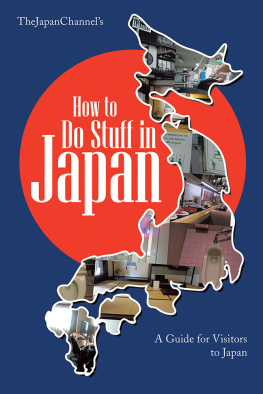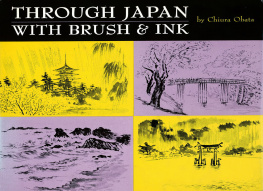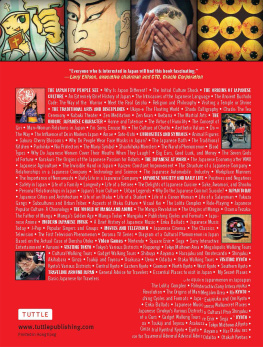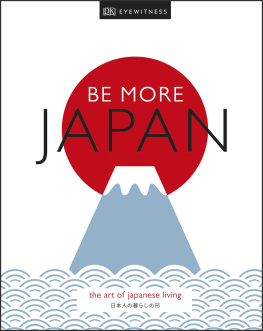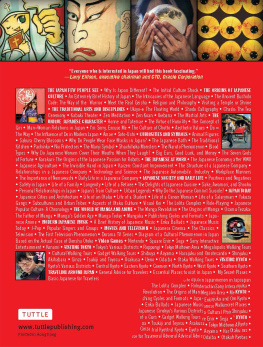The JapanChannels
How to Do Stuff in
JAPAN
A Guide for Visitors to Japan

Copyright 2015 TheJapanChannel.com.
All rights reserved. No part of this book may be reproduced, stored, or transmitted by any meanswhether auditory, graphic, mechanical, or electronicwithout written permission of both publisher and author, except in the case of brief excerpts used in critical articles and reviews. Unauthorized reproduction of any part of this work is illegal and is punishable by law.
ISBN: 978-1-4834-4277-8 (sc)
ISBN: 978-1-4834-4276-1 (e)
Library of Congress Control Number: 2015920065
Because of the dynamic nature of the Internet, any web addresses or links contained in this book may have changed since publication and may no longer be valid. The views expressed in this work are solely those of the author and do not necessarily reflect the views of the publisher, and the publisher hereby disclaims any responsibility for them.
Any people depicted in stock imagery provided by Thinkstock are models, and such images are being used for illustrative purposes only.
Certain stock imagery Thinkstock.
Lulu Publishing Services rev. date: 12/11/2015
Introduction
Whether you are visiting Japan for a short holiday or planning to live in Japan long term, you can get the most out of your time by understanding a bit more about how things are done in this amazing country.
Japanese culture and customs are VERY different from those of other countries. This makes Japan a fascinating place to visit, but also means that we can make a total embarrassment of ourselves or those around us, simply by doing what is considered totally acceptable in our home countries!
Japanese people are incredibly kind and will appear to accept almost anything we say or do. HOWEVER, the reactions to our innocent mistakes could result in us not being included in a social event or activity, or being refused accommodation or employment. At best, our mistake might cause some embarrassment; at worst, it might turn our happy visit into a disaster. By learning to do things the way they are usually done in Japan, we not only avoid potentially negative consequences, but we also increase the chances of something positive happening to us - whether that be a simple invitation to a party or the chance to rent an apartment. In a land where conforming is very important, knowing how Japanese people think and act can make a substantial difference to the quality of a visitors experience!
We have spent six years making How to do Stuff in Japan videos for Youtube. These videos have been modestly popular, with many people kindly leaving comments about how useful they found the videos, some suggesting that the most important points be compiled for a book - this book! Contained within are the most useful tips and information from those videos, plus a few more, presented in a way which will be easy to understand.
Some of the language in this book is quite direct. This is not meant to offend. The intention is to make it simple and easy to understand, in the same way that we might advise our friends or family members if they were to visit Japan. (In fact, they will be reading this book too!)
We hope that the information in the following chapters will not only save you from potential problems or embarrassment, but also help you to make the most of your opportunities and transform your time in Japan into a wonderful experience.
Enjoy!
Contents
Bring Cash! (Enough for your entire stay, if you can.)
Credit cards and ATMs are common in Japan, but can be troublesome and/or expensive to use for many reasons. (Your bank may tell you otherwise but dont believe a word!)
Credit cards are useful for renting cars and for a few other services, so they are handy to have on you AS WELL, but cash is definitely the better option for everything else.
Japan has very low crime rates, so the chances of your cash being taken from you are very low.
Before buying Yen, compare the exchange rates of your local banks, the airport foreign exchange counter and Japan Post to see who is offering the most favourable rate.

If you bring more than 1 million yen (or equivalent in foreign currency) you will need to declare it on the declaration form when you enter Japan, but it will not cause any problems. In fact, Immigration like to see that you have sufficient funds to support yourself during your stay.
Clothes in Japan can be rather cheap to buy, compared to many other countries. Large sizes are not exactly commonplace, but certainly available.
Japanese people are usually very careful to wear clean clothes in good condition, so it is wise to do the same. Remember - it is customary to remove ones shoes when entering homes/offices/temples, so there will be many opportunities for people to see your socks. Make a point of keeping them clean and in good condition too!
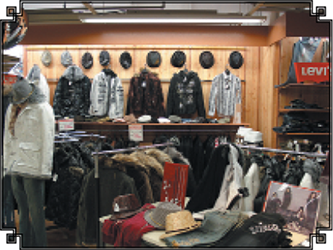
As you will be taking your shoes off and putting them back on regularly, it is wise to bring shoes that make this easy to do.
For ladies, short skirts and short pants are often popular in Japan, but tops that expose bellies or breasts are less fashionable. They can be considered inappropriate and may have the effect of attracting unwanted attention.
If you have tattoos, make an effort to wear clothes that will cover them. In Japan, peoples attitudes toward tattoos are slowly changing, but there are still many places like public pools, water parks and spas where people with tattoos are not permitted entry. Visible tattoos can make life in Japan difficult for you.
Pierced ears and other piercings are less common in Japan than most other countries. While they are becoming more common amongst younger people, they can still create a negative impression and have negative consequences particularly in relation to employment or accommodation. It is easier to remove them and avoid the potential disadvantages they may create.
Piercings, tattoos and other similar fashion statements can often create ambiguous attention in Japan. People often tell us our advice is wrong because Japanese people have told them how cool their tattoos/piercings/low-cut tops are. Of course they were told that that. Japanese people are polite and generous in their compliments, to the point of telling us the opposite of the t ruth!
As we have said many times before, dont expect Japanese people to tell you anything negative because they probably wont. (That is why we wrote this book!!)
Sunglasses are not as common in Japan as they are in many other countries. Japanese people often find foreigners who wear sunglasses to be a bit intimidating. When indoors or when talking to people, it is best to remove them.
Perfume and aftershave can be left at home. In Japan, while personal cleanliness is extremely important, people try to give off no odour at all. Smelling bad is obviously not desirable, but smelling of perfume, aftershave or other fragrances is also considered unpleasant. Soaps, shampoos, antiperspirants and deodorants in Japan usually have no fragrance, or a very weak fragrance so that other people will not perceive it. The aim is to be neutral with NO smell at all.
When a person smelling of perfume or aftershave walks past Japanese people, they often react by looking at each other and holding their noses. No need for any com ment.
Next page
